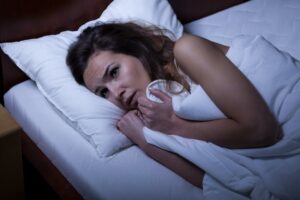Have you had an inkling that you need to go in for a sleep study? Chronic loud snoring, waking up in the middle of the night gasping for air, daytime fatigue—these are some of the most common signs of obstructive sleep apnea, but did you know that this condition can also lead to nightmares? Read on to learn how you can identify sleep apnea, what it is, and why it could cause you to have more nightmares.
What is Obstructive Sleep Apnea?
Obstructive sleep apnea is the most common type of sleep apnea, estimated to impact upwards of 10 percent of the population globally. It’s the result of an airway obstruction that causes irregular and fragmented sleep patterns. When your brain doesn’t receive enough oxygen as you sleep due to the obstruction, it can cause you to wake up gasping for breath, not only drastically minimizing your oxygen intake, but also restarting your sleep cycle.
These reoccurring episodes are called apneas and can lead to dire medical and health consequences down the road when left untreated. Research has shown that untreated sleep apnea can put people at a higher risk of stroke, heart attacks, diabetes, and more.
Does Sleep Apnea Cause Nightmares?
So, what do nightmares have to do with sleep apnea? A study published in October of 2019 in Frontiers in Neurology found that people with sleep-breathing disorders are more likely to have unusual dreams. These can be related to symptoms of their sleep apnea, like depression and increased anxiety, and have been shown to decrease with the use of treatments like a CPAP device or oral appliance.
Can Sleep Apnea Treatment Help?
The study’s findings were that intervention of obstructive sleep apnea helped improve the frequency of patients’ nightmares. The important part of treatment is to find a method that actually works for you. While some patients opt for and do well using a CPAP machine, others can’t stand having something on their face throughout the night.
CPAP-intolerant patients don’t have to just accept their condition, though. Oral appliance therapy utilizes a custom-crafted device to shift the mouth in a way that keeps the airway free of obstruction. This helps minimize symptoms, improve sleep quality, and keep nightmares at bay!
Although seeking out help for sleep apnea treatment may feel like a big feat, the benefits of doing so are absolutely priceless to both your health and wellbeing. If you’re experiencing common signs of obstructive sleep apnea or are CPAP-intolerant and looking for a new solution, give your dentist a call.
About the Author
Dr. John Ludu has dedicated most of his career to advanced specialty procedures, including dental implants, endodontics, and sleep apnea treatment. He is an active member of the American Academy of Dental Sleep Medicine and regularly helps patients who are CPAP-intolerant find the restful night of sleep that they deserve with oral appliance therapy. To schedule a consultation and learn more, visit DuPont Family Dentistry’s website or call 253-964-7000.

